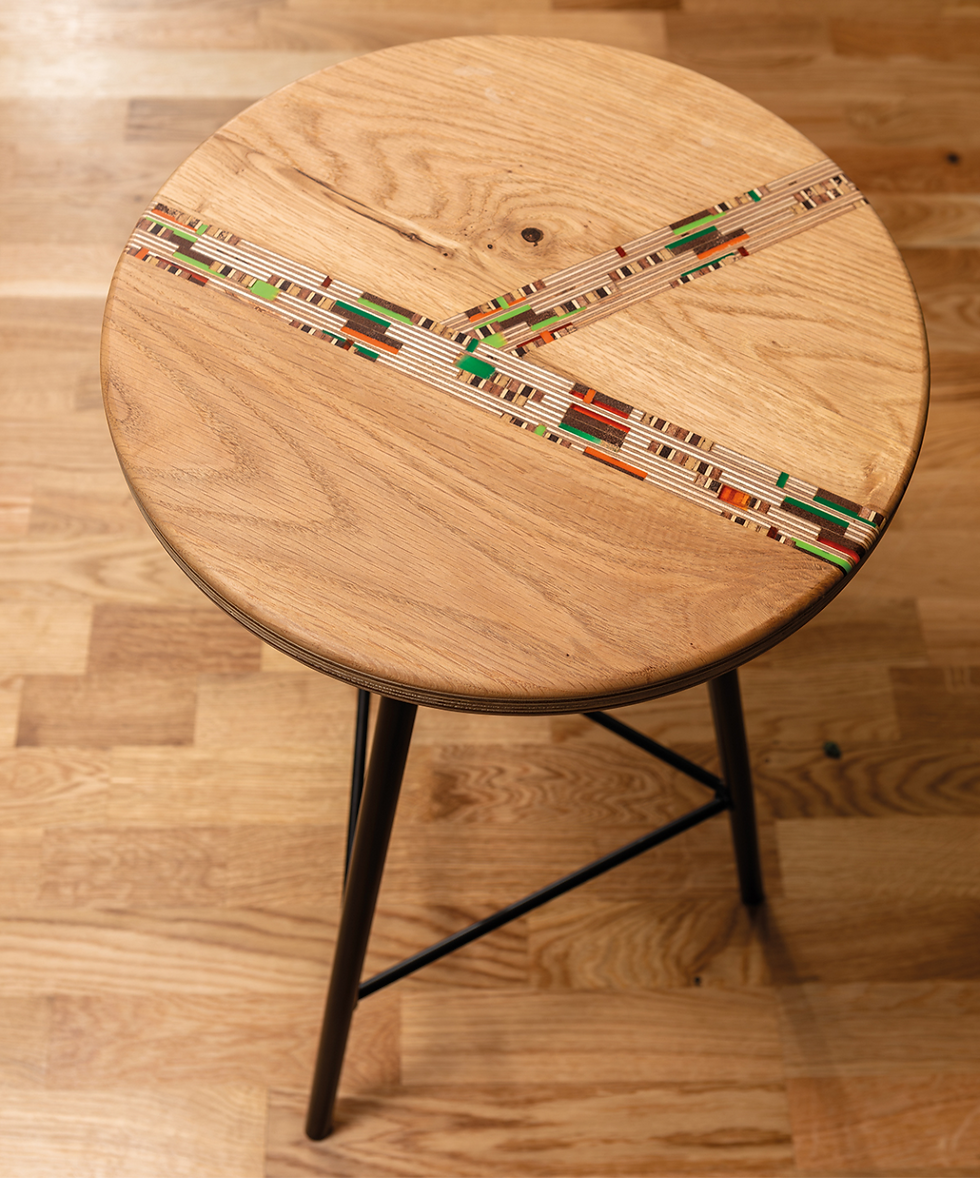Waste into wonder
- Sep 16, 2025
- 4 min read
Words by Jamie Crocker
Modern Marquetry transforms Cornwall’s discarded materials into luxury.

The kitchen carcass tells no lies. Strip away the marketing veneer of sustainability claims and eco-friendly credentials, and you’re left with a trail that leads to something that you weren’t expecting. That something can be solid oak harvested from ancient woodlands but with an environmental stamp of approval added as it leaves the factory, birch plywood shipped from halfway round the world, or – as Ravi and Dan from Stratum Marquetry prefer – recycled materials compressed into surprisingly robust sheet material.
Their workshop in Nancegollan represents something genuinely different in the world of bespoke furniture. While traditional marquetry has remained unchanged for centuries, content to reproduce historical patterns with historical methods, Stratum Marquetry has reimagined the entire discipline. They’ve taken an ancient craft and thrust it into contemporary relevance by addressing one of our most pressing concerns: waste.
The revelation comes when you understand their process. Where conventional marquetry relies on virgin timber cut specifically for decorative purposes, Stratum sources its materials from the detritus of other industries. Off-cuts from joinery workshops in Newquay, plywood scraps from Falmouth and sometimes architectural waste from Bristol and London; materials that would otherwise feed wood burners or end up in landfills become the foundation for furniture.
This isn’t charity work masquerading as commerce. The company has positioned itself firmly within the market of those seeking something unique but with impeccable eco credentials. The business model reflects this understanding. Their Signature Range offers entry-level access to modern marquetry, with patterns designed specifically around materials readily available within their local network. These pieces showcase what’s possible while maintaining commercial viability.

For clients seeking ultimate exclusivity, Stratum provides bespoke design services, creating unique patterns that ensure no other surface exists like it anywhere in the world. This dual approach solves a fundamental problem in luxury markets: how to maintain exclusivity while achieving scale. Stratum’s method manages to generate infinite variety but in a viable quantity.
The psychological appeal runs deeper than mere aesthetics. Ravi describes meeting interior specialists who confirm that wealthy clients increasingly demand uniqueness as their primary criterion. Traditional luxury items like exotic hardwoods harvested from rainforests; materials that require years of processing, now carry uncomfortable associations with environmental destruction. Stratum offers something far more compelling: surfaces that actively repurpose waste while creating objects of genuine beauty.
The company’s expansion plans reveal further ambition. Rather than simply replicating their Cornwall workshop elsewhere, they envision a network of community-focused branches. Each location would establish relationships with local waste producers while running educational workshops for charity users and community groups. Participants would learn about material value, waste reduction, and basic marquetry techniques while processing significantly more waste material than a purely commercial operation could handle.
This community element transforms the business from furniture production into something approaching a social enterprise. The workshops would create positive experiences for participants while diverting more waste from landfills, establishing Stratum as integral to local sustainability efforts rather than just another luxury furniture maker.
Corporate collaborations add another dimension to their strategy. They’re developing partnerships with established brands, reproducing existing patterns through marquetry techniques to create unique product lines. A London interiors company called Chinakwe wants their signature patterns translated into marquetry surfaces for furniture and flooring. An established frames and mirrors business – Patrick Ireland Frames – seeks collaborative pieces incorporating chosen marquetry patterns.
Most intriguingly, they’re exploring relationships with manufacturers whose waste becomes their raw material. An Italian company producing sunglasses from recycled plastic has expressed interest in commissioning a conference table incorporating their own waste materials. The symbolism proves irresistible – a company’s discarded materials transformed into a statement piece for their own boardroom.
This approach challenges conventional definitions of luxury goods. The conference table made from Amazon rainforest timber, requiring four years from felling to delivery, no longer represents the pinnacle of exclusivity. Instead, luxury increasingly means demonstrating values alignment, showing guests and clients that your choices reflect contemporary environmental consciousness without sacrificing aesthetic quality.
The shift reflects broader generational changes in purchasing behaviour. Young designers graduating from product design courses question buying anything made from virgin materials when alternatives exist. A table needs to demonstrate values that tap into the zeitgeist, which involves wearing its credentials on its surface.
Stratum positions itself perfectly within this transition. They’re not simply offering recycled furniture; they’re providing entry points into a lifestyle philosophy that prioritises material reuse without compromising on visual impact. Their surfaces create conversation pieces that allow owners to discuss sustainability without appearing sanctimonious.
The technical innovation shouldn’t be understated. Traditional marquetry works with predictable materials possessing known characteristics. Stratum must constantly adapt to whatever waste materials become available, developing techniques for incorporating diverse substances into cohesive decorative schemes. This flexibility becomes a competitive advantage, enabling them to create surfaces impossible through conventional methods.
ABOVE: Details within kitchen cabinetry
They’re participating in a fundamental shift in how we define value, luxury and responsible consumption. Their planned engagement with the Community Interest Company (CIC) scheme will highlight how they intend to channel some of their commercial success into social benefit. Five per cent of all profits support Plant One Cornwall, funding habitat regeneration projects that customers can join, creating tangible connections between purchase and environmental restoration.
The challenge remains substantial. Converting traditional buyers requires education and evangelism. Many potential clients need convincing that recycled materials can produce surfaces as beautiful and durable as those made from virgin timber, but Dan and Ravi recognise that this won’t be an overnight transition.
Yet the trajectory seems inevitable. Architecture practices now specify that projects must create a net positive environmental impact. Interior designers increasingly seek suppliers aligned with sustainability principles. The guilt originally associated with religious transgression has indeed been replaced by environmental guilt, creating market pressure that favours companies like Stratum.

Their success won’t come from superior craftsmanship alone. Instead, it stems from recognising that contemporary luxury requires different justifications than historical luxury. The client seeking a unique dining table wants beauty, certainly, but they also want a story they can tell without embarrassment.
Stratum Marquetry craft items that provoke admiration while supporting values that matter to increasingly environmentally conscious consumers. In transforming waste into wonder, they’ve discovered that the most compelling luxury might be the knowledge that your choices improve rather than degrade the world around you.




















